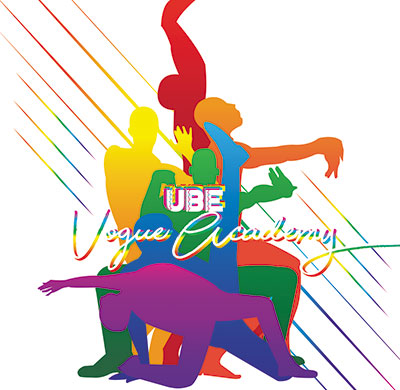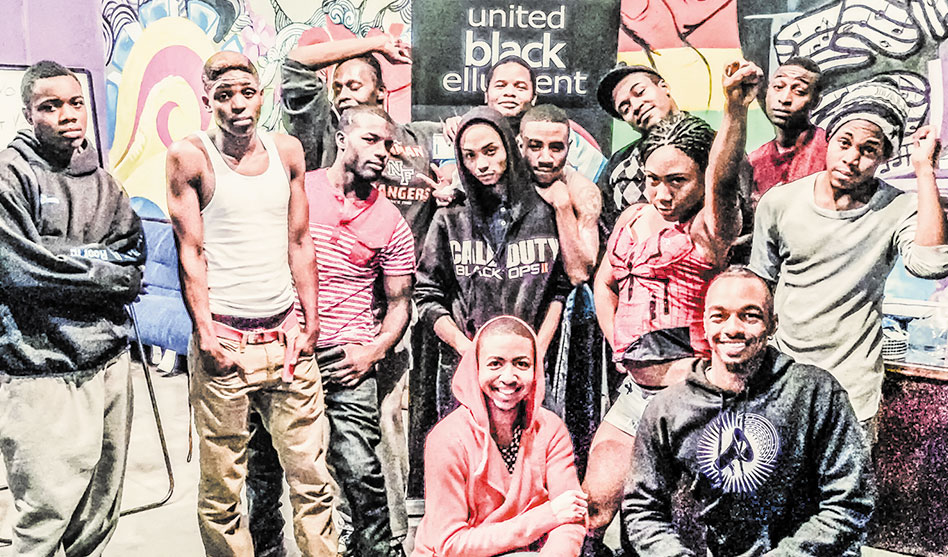UBE’s Vogue Academy puts the power in the pose
RICH LOPEZ | Staff writer
rich@dallasvoice.com
Strike a pose; there’s nothing to it. At least, that’s the intention every Friday night at United Black Ellument’s Vogue Academy. The weekly class held at Resource Center teaches the fundamentals of vogueing, but it has also become a place for community — proving the power of dance and expression.
United Black Ellument is a program at the Center geared toward empowering young, Black, same-gender-loving men. Director Jalenzski Brown oversees the happenings for UBE, including the academy.
“There would be no academy without Jalenzski,” said Cedrick Johnson, who goes by Jrock.
In turn, there wouldn’t be the academy without Jrock. He serves as the founder of today’s iteration of Vogue Academy and volunteers with Resource Center to teach his weekly students. He also founded the ballroom kiki scene that stems from the academy.
Brown and Johnson host the classes, but their impact goes well beyond the RC doors.
“The most important part of all this is having fun and serving that self-expression,” JRock said. “When we started to formalize it, it grew into this big thing.”
A quick history
The ballroom scene — or ball culture — is a queer subculture started in New York City by Black and Latino communities. The scene was created as an alternative to the drag pageants happening in the 1970s. Today, drag queen Crystal LaBeija is often credited with founding ballroom culture some 50 years ago.
“The House of LaBeija was created as an opposition to the racism that was happening in drag pageants at that time,” said Jrock, whose full ballroom name is Jrock Juicy Couture Ebony.
Houses are found families that compete in balls but also serve as a support system for their members. Houses are led by “mothers” and “fathers.”
Academy origins
“UBE was hosting ‘Get Your Life’ ballroom practice back in 2014,” Brown said. “It started as a monthly thing until JRock came in and reimagined it entirely.”
Back then, the ballroom kids would have a time and place to come out and practice. JRock described it as a time of fellowship and a way for the participants to find their tribe.
But Jrock saw a bigger potential.
“Once I came along, I declared that I was going to have a ball,” he said. “We were gonna have a mainstream ballroom called Girls Just Wanna Have Fun. I got there in May 2016, and we were gonna have the ball in June. So we had four weeks to get ready for it.”
The ball came and went, but the students kept coming back for more.
At that time, UBE was based in Deep Ellum.
“We had the space for it, and since they were coming in weekly, we called it Vogue Academy and started structuring it since it was becoming a weekly thing,” JRock said. “The other founder of the academy is Boss Lady Jakai Agacii.”
……………………..
Basic ballroom glossary

Ballroom culture has its own language which has permeated its way into mainstream culture. Shows like Pose, RuPaul’s Drag Race and Legendary have brought those terms into the light. So what do they mean? Here’s a primer of a few basic ballroom terms.
• Ballroom: Emerging from the Harlem Renaissance, this is the umbrella term for the culture and scene, whereas, balls are the serious formal competitions among the houses.
• 007: A free agent in ballroom who is not part of a house.
• Kiki: A competition with less serious stakes. According to Jrock Juicy Couture Ebony, kikis function for newer or younger ballroom artists or “children” bringing in new styles to the scene before hitting the actual ballroom runways.
• House: Formed within the community, a house serves as a found family and support system led by a mother or father. Often, the house supports young adults starting in the scene but also needing resources for daily life.
• Icon: A revered classification that surpasses legendary status.
• Legend: A winner of multiple trophies with an extensive ballroom history, a veteran of the scene.
• Walk: To enter a ballroom category
……………………..
Deep in vogue
Then UBE left Deep Ellum to move into Resource Center’s current building on Cedar Springs Road. Brown and Johnson were concerned that the change would affect the academy and the students who were comfortable going to the original space. It didn’t.
“More kids kept coming out to the scene, and they kept hearing about it,” Jrock said.
Today, the academy breaks down the elements of vogue. This is the place to go to “mess up and look silly” before attempting an appearance at the balls with no training. No one wants to look messy at a ball.
At the academy, students learn hands, catwalk, spins, schwams (“not shablams”) and dips (“not deathdrops”).
“When we put it all together, we let it flow with club house music and commentating,” Jrock explained. “We open up the floor for freestyling.”
Some have come with two left feet, and in three to six months, they are snatching trophies, he added.
Vogue Academy though is not just for UBE members. Friday nights are open to anyone wanting to learn how to let their body go with the flow.
“We never shut down the academy. It’s open to everyone,” Brown said. “All kinds of people come in on Friday night, and we’re creating these bonds.”
Love is the message
What starts in the Vogue Academy certainly doesn’t stay there. As its scene grows, so does the scene outside Friday nights.
But what Brown sees is more than the vogue moves and music; he sees a community of people coming together through love and culture.
“It’s this network of people not only for UBE and RC, but for people in the scene. When we formalized Vogue Academy, more resources were poured into it. And we started the Gulf Coast Kiki Coalition which now has almost 900 members.”
Plus, UBE still has to do its thing.
Brown explained, “It may look like we’re having fun all the time, but we are a movement that is here to enable and empower young Black men. The fun brings people out, but they come with their stories and need help, so we get to do that too.
“But it’s really beautiful to see how the scene has grown and people forming their own organizations and doing the balls. It shows that the work of UBE has extended,” he added.
Brown and Jrock note that the scene really took off in 2019. They were hosting three to four mini-kiki balls and mini balls a year, with people coming from all over to compete. By the end of 2019, they teamed up with DJ Rudeboy and Marty’s Live for a Wednesday night gig.
“By Christmas, we had Wednesdays for kiki vogue nights, with all these categories that allowed our scene to express themselves,” Jrock said.
Then the coronavirus hit hard, but Vogue Academy still kept it going in its own way: “We learned how to do ballroom in a pandemic,” Jrock declared.
Zoom and virtual balls kept the spirit and love alive.
Catwalk of fame
Today, Vogue Academy and the Wednesday night scene at Marty’s keep Dallas’ ballroom culture on the map. Some have graduated, if you will, and have taken their talents beyond. House of Ebony’s XaPariis, a VA alum, competed on HBO’s Legendary with House of Balmain’s Cali Dequan, also from Dallas. Jrock mentioned that many performers have gone on to snatch titles and trophies in other big ballroom cities such as Atlanta and New York.
“Our networking spreads way beyond Texas now,” Jrock said. “It’s kind of underground but all over the world, and our balls have up to 500 people. We’ve had a kiki ball at the Dallas Museum of Art, so even institutions outside the scene are finding us.”
Both Brown and Johnson have deep pride in not only the scene and its legacy but UBE’s part in all of it.
“All this happened right here at UBE,” Brown said. “These kids are serious and continue dancing when we all leave the Resource Center. We’re proud of this scene but also proud that they find family in this ballroom culture.”
Visit UBEDallas.org for more about Vogue Academy. Watch videos of the local scene and more at Jrock’s The TensOrChops Television Network on YouTube.
For more photos, click here.

